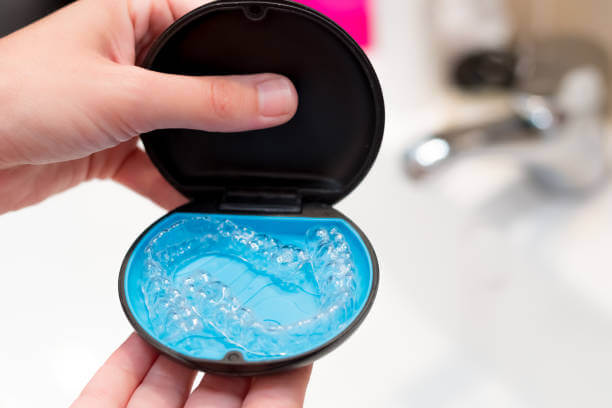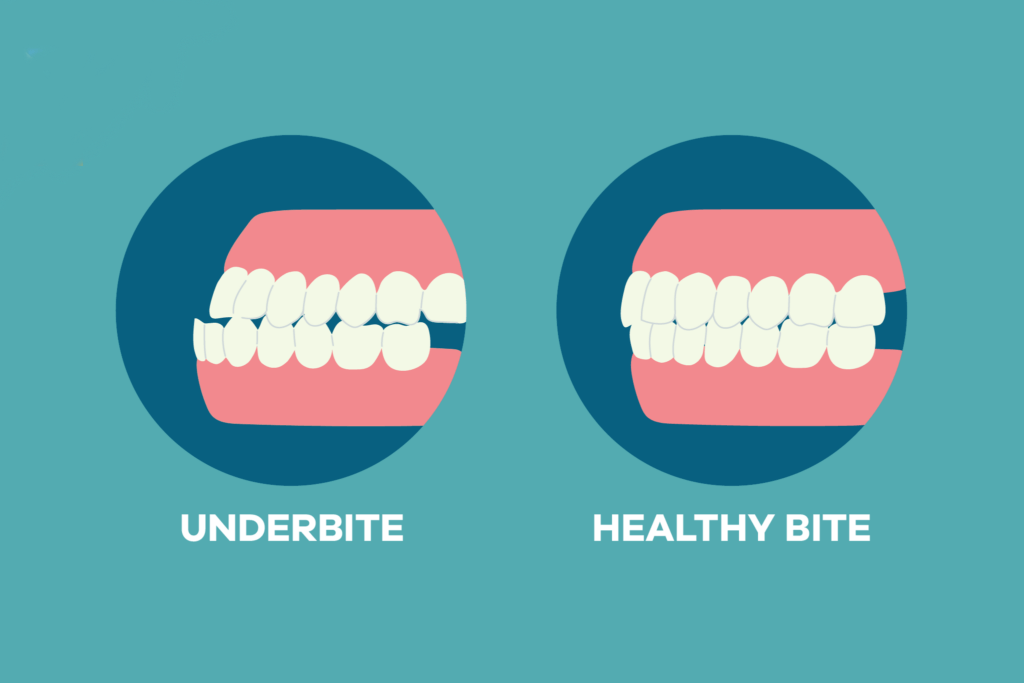Are you wondering if Invisalign can fix an underbite? The good news is that it can, but it’s important to note that each case is unique and requires a personalized approach. Invisalign’s clear aligners are effective and convenient for treating a range of orthodontic problems, including underbites. However, to determine the best treatment plan for your specific oral health needs, it’s recommended that you consult your dentist. In this article, we’ll explore the potential of Invisalign in correcting underbites.


An underbite is a type of dental misalignment characterized by the lower front teeth extending beyond the upper teeth. This dental condition arises primarily due to problems with the lower jaw alignment, resulting in its forward protrusion. On the other hand, an overbite represents the reverse dental misalignment scenario, where the upper front teeth are positioned ahead of the lower teeth.
Underbites can range from mild to severe and usually require dental treatment such as Invisalign or traditional braces to correct the bite. Without treatment, underbites can cause problems like mouth breathing, difficulty speaking, and a higher risk of tooth decay and gum disease.
Underbites can vary in severity and cause, with a range of conditions falling under this category. Depending on the type of underbite, Invisalign can correct an underbite, and it can be quite effective when the misalignment is primarily attributed to tooth positioning. However, when the underbite has a skeletal origin, it may require alternative treatments or a blend of approaches. There are many different types of underbites, so there is no one-size-fits-all orthodontic treatment. Here are some examples of the different types of underbites.
Underbites can be more than just a cosmetic issue, as their severity can lead to various complications that impact both physical and mental well-being. One common issue associated with underbites is Temporomandibular Joint Disorder (TMJ), which can result in chronic jaw pain and discomfort. TMJ may also cause sensations of a locked or stuck jaw, popping sounds, and significant jaw pain. Other consequences of TMJ include chronic headaches, toothaches, earaches, dizziness, and even hearing problems.
If left untreated, an underbite can cause several problems such as difficulty in eating and chewing, tooth decay, headaches, chronic mouth breathing, speech issues, bad breath, and sleep apnea. These issues can potentially lead to further complications, such as asthma and intermittent breathing cessation during sleep. Moreover, an underbite can affect the facial appearance, leading to self-consciousness, lower self-esteem, and negatively impacting mental health. However, addressing an underbite through orthodontic treatment can help reduce these complications and improve both oral health and overall well-being.
If you have an underbite, Invisalign may be able to help you. This treatment option involves using clear, custom-made aligners that gently shift your teeth and jaws into their proper positions over time. Unlike traditional braces, Invisalign aligners are removable and virtually invisible. They apply controlled pressure to your teeth, gradually correcting their alignment.
For underbites, Invisalign can be particularly effective at moving the lower teeth back and the upper teeth forward, which helps to bring the jaws into the correct position. This treatment is generally more comfortable and less conspicuous than traditional braces, which is why it’s a popular choice for underbite correction. However, the success of Invisalign treatment for underbites depends on the severity of your condition, so it’s important to speak with an orthodontist to determine if it’s the right option for you.
Invisalign is a popular option for correcting mild to moderate underbites. It has been proven effective in many cases. However, it’s important to note that severe or skeletal underbites may require alternative treatments like orthognathic surgery or traditional metal braces. It’s essential to consult with an orthodontist or dentist for a thorough evaluation to determine the most suitable treatment for each individual. This assessment will ensure that patients receive a personalized treatment plan that addresses their specific condition and requirements.
When considering Invisalign treatment for this type of orthodontic issue, several factors should be taken into account.
Determining whether to correct an underbite with Invisalign is a personal decision. Correcting an underbite can have cosmetic benefits, such as reducing the appearance of a protruding jaw and enhancing facial appearance. Additionally, addressing a natural underbite can prevent premature enamel wear on your front teeth, which can occur due to improper positioning. Ultimately, the decision depends on your preferences and priorities.
If you are not concerned about the cosmetic or dental issues associated with an underbite, you may choose not to pursue this type of treatment. It is crucial to consider the advantages and disadvantages and consult with an orthodontist who can provide advice based on your specific needs and goals.
In some instances, severe underbite could require a more comprehensive orthodontic solution than Invisalign can provide. Severe cases may require traditional orthodontic treatment methods like metal braces or even surgery. Your dentist or orthodontist can advise you on the best treatment options based on your individual needs.
In most cases, the results obtained from Invisalign are permanent. However, there is always a risk of relapse if proper aftercare is not followed. Retainers are usually recommended post-treatment to maintain the results achieved during the correction phase. Regular dental check-ups will also ensure that your underbite does not recur.
Invisalign treatment duration depends on the severity of the underbite and your compliance with wearing the aligners.
Yes, Invisalign can treat various other dental issues beyond underbites. Invisalign’s clear aligner system is versatile and can effectively address several orthodontic problems, including gaps between teeth, crowded teeth, misaligned teeth, and other types of bite issues.

Are you feeling self-conscious about your smile and wish for that confident smile? Look no further than Sloan Creek Dental, your trusted Invisalign dentist located in Fairview, TX. With Sloan Creek Dental’s Invisalign treatment, you can discreetly and comfortably achieve the perfect smile you’ve always desired.
If you’re in the Fairview or Allen area and would like a straighter smile, contact us at our Fairview, TX dental office to schedule your initial consultation at 972-468-1440.
We firmly believe that the internet should be available and accessible to anyone, and are committed to providing a website that is accessible to the widest possible audience, regardless of circumstance and ability.
To fulfill this, we aim to adhere as strictly as possible to the World Wide Web Consortium’s (W3C) Web Content Accessibility Guidelines 2.1 (WCAG 2.1) at the AA level. These guidelines explain how to make web content accessible to people with a wide array of disabilities. Complying with those guidelines helps us ensure that the website is accessible to all people: blind people, people with motor impairments, visual impairment, cognitive disabilities, and more.
This website utilizes various technologies that are meant to make it as accessible as possible at all times. We utilize an accessibility interface that allows persons with specific disabilities to adjust the website’s UI (user interface) and design it to their personal needs.
Additionally, the website utilizes an AI-based application that runs in the background and optimizes its accessibility level constantly. This application remediates the website’s HTML, adapts Its functionality and behavior for screen-readers used by the blind users, and for keyboard functions used by individuals with motor impairments.
If you’ve found a malfunction or have ideas for improvement, we’ll be happy to hear from you. You can reach out to the website’s operators by using the following email
Our website implements the ARIA attributes (Accessible Rich Internet Applications) technique, alongside various different behavioral changes, to ensure blind users visiting with screen-readers are able to read, comprehend, and enjoy the website’s functions. As soon as a user with a screen-reader enters your site, they immediately receive a prompt to enter the Screen-Reader Profile so they can browse and operate your site effectively. Here’s how our website covers some of the most important screen-reader requirements, alongside console screenshots of code examples:
Screen-reader optimization: we run a background process that learns the website’s components from top to bottom, to ensure ongoing compliance even when updating the website. In this process, we provide screen-readers with meaningful data using the ARIA set of attributes. For example, we provide accurate form labels; descriptions for actionable icons (social media icons, search icons, cart icons, etc.); validation guidance for form inputs; element roles such as buttons, menus, modal dialogues (popups), and others. Additionally, the background process scans all of the website’s images and provides an accurate and meaningful image-object-recognition-based description as an ALT (alternate text) tag for images that are not described. It will also extract texts that are embedded within the image, using an OCR (optical character recognition) technology. To turn on screen-reader adjustments at any time, users need only to press the Alt+1 keyboard combination. Screen-reader users also get automatic announcements to turn the Screen-reader mode on as soon as they enter the website.
These adjustments are compatible with all popular screen readers, including JAWS and NVDA.
Keyboard navigation optimization: The background process also adjusts the website’s HTML, and adds various behaviors using JavaScript code to make the website operable by the keyboard. This includes the ability to navigate the website using the Tab and Shift+Tab keys, operate dropdowns with the arrow keys, close them with Esc, trigger buttons and links using the Enter key, navigate between radio and checkbox elements using the arrow keys, and fill them in with the Spacebar or Enter key.Additionally, keyboard users will find quick-navigation and content-skip menus, available at any time by clicking Alt+1, or as the first elements of the site while navigating with the keyboard. The background process also handles triggered popups by moving the keyboard focus towards them as soon as they appear, and not allow the focus drift outside of it.
Users can also use shortcuts such as “M” (menus), “H” (headings), “F” (forms), “B” (buttons), and “G” (graphics) to jump to specific elements.
We aim to support the widest array of browsers and assistive technologies as possible, so our users can choose the best fitting tools for them, with as few limitations as possible. Therefore, we have worked very hard to be able to support all major systems that comprise over 95% of the user market share including Google Chrome, Mozilla Firefox, Apple Safari, Opera and Microsoft Edge, JAWS and NVDA (screen readers), both for Windows and for MAC users.
Despite our very best efforts to allow anybody to adjust the website to their needs, there may still be pages or sections that are not fully accessible, are in the process of becoming accessible, or are lacking an adequate technological solution to make them accessible. Still, we are continually improving our accessibility, adding, updating and improving its options and features, and developing and adopting new technologies. All this is meant to reach the optimal level of accessibility, following technological advancements. For any assistance, please reach out to